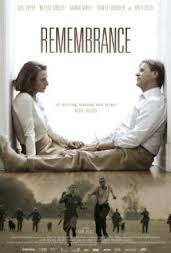
REMEMBRANCE/ DIE VERLORENE ZEIT
Germany, 2011, 105 minutes, Colour.
Alice Dwyer, Dagmar Manzel, David Rasche, Matheus Damiecki, Suzanne Lothar, Lech Machiewicz, Joanna Kulig.
Directed by our Anna Justice.
Remembrance is an emotional film, made almost 70 years after the initial events, almost 40 years after the secondary events. It is a German film, much of the dialogue in German, but in the scenes in New York in English, as well as the conversations between Hannah and Thomas, the central characters.
The structure of the film has the two time sequences, the concentration camp in 1944, life in Brooklyn in 1976. The screenplay continually intercuts the two stories, especially as they become reminiscences, remembrances of Hannah.
While the concentration camp scenes are rather familiar, it does not lessen the emotional impact in watching them. Hannah is a young woman doing drudgery work in the camp, Thomas is Polish and works in the office. He falls in love with Hannah even before speaking with her, supplies her with some extra food, organises an escape attempt which succeeds. He takes Hannah to his family, is shocked at his mother’s anti-Semitic disdain, has to go to Warsaw and does not return in time and Hannah thinks he is dead. Because Hannah and his sister-in-law were taken by soldiers, he assumes she is dead.
Much of the action takes place in New York, where Hannah is now married to an academic and has a daughter. By chance, she sees a television interview with Thomas and takes steps to find him – and his successful. Is an academic in Poland with the daughter. The emotion when they each realise the other is alive is powerful – and Hannah’s husband urges her to visit Thomas. As the couple meet, the film ends leaving everything to the audience’s imagination and hopes.
1. The impact of the film and its World War II and Holocaust story? From the 21st century perspective? On the Nazis, on Germany, on Poland? Anti- Semitism?
2. The re-creation of the concentration camp, the surroundings and woods, rivers? The Polish villages? The contrast with Brooklyn in 1976, apartments, streets, dry-cleaning shop? The sense of realism in each year? The 30 years in different times?
3. The title, for Hannah? For Thomas? For older audiences who would have experienced something of this? For their descendants? The Americans and their trying to comprehend?
4. The 1944 story: the details of the concentration camp, Hannah, amongst the other women, their work, the poor treatment, the dormitories, the lack of food? Hannah and her encounter with Thomas? His falling in love with her? His work, the office, supervising the food? Getting food to Hannah? His plan for the escape? The documents, the Nazi uniform? His commanding Anna to leave, going to the gate, the sexual banter with the guard? The getting out of the camp, running into the woods, his changing his clothes? The pursuit by the guards, the dogs? Swimming the river? The escape? Love, consummation? The German women in the field, their stealing their car?
5. The village, Thomas and his family, his mother’s disdain for Hannah? Magdalena and her help? Hannah and her pregnancy? Thomas and the others going to Warsaw? Only one returning? Thomas being wounded, presumed dead? The Germans coming to the house, wanting to go horse riding, Hannah hiding in the cupboard, Thomas’s mother and her protection? The roundup of the women, Magdalena being taken, Hannah being taken? Thomas and his return, his mother telling him that Hannah was dead?
6. The intercutting of the two stories, the time difference, the characters ageing, future presuming the other dead? The effectiveness of the intercutting, memories, remembrance?
7. Hannah, 30 years later, living in Brooklyn, having escaped? The comfortable life? Her husband, her love him? The daughter? The party, the daughter’s concern about her mother, moodiness? Her husband’s concern?
8. Going to the dry-cleaning, the return, hearing Thomas on the television? The impact? Her call to the enquiry centre, the rude reaction on the phone, the authorities and their agreeing to search? The phone call, finding Thomas and giving the phone number? Hannah and her moodiness at the party, going to sit watching the river? Her return, Daniel’s concern, his knowing of the situation, his wanting to share things with his wife? At the table, the book, showing it to her daughter?
9. The phone call, Thomas answering, hanging up, Hannah ringing again? His amazement? The emotional effect? The later phone call? The explanations? Thomas and his daughter, her University studies, the situation in Communist Poland, authorities, repression?
10. Daniel urging Hannah to visit Poland, travelling, in the bus, getting out, Daniel in the car, standing waiting? The reunion?
11. The moment for the film to end? Leaving an imagination of the future, whether they should stay together, whether their lives had so changed that this was just a reunion, but not forever?